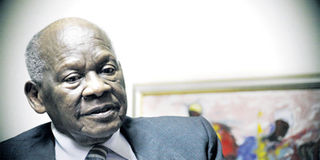A towering tale couched in a tiny frame

When Maina Wanjigi was studying for his second master’s degree at Stanford University in America in 1960, he and his friends identified a lucrative business — turning textbooks into condensed mimeographs to be sold to “lazy” students who did not want the burden of reading long intricate treatises. PHOTO | NATION
What you need to know:
- Take, for instance, his description of the circuitous process he had to go through before the Pope, communicating from Rome in the era before text messages and Facebook, could allow him to marry a Catholic girl. Wanjigi’s delivery of the punch line is flawless.
- Almost always, Wanjigi talks of his role as “a contribution”, “having helped to steer”, “glad to have been involved” — always with a focus on the collective even when he was the actual pioneer of positive things.
When Maina Wanjigi was studying for his second master’s degree at Stanford University in America in 1960, he and his friends identified a lucrative business — turning textbooks into condensed mimeographs to be sold to “lazy” students who did not want the burden of reading long intricate treatises.
It seems that Wanjigi emerged from that venture with two enduring skills. First, a nose for mobilising collective business enterprises which became the hallmark of his 25-year tenure as Kamukunji MP and, secondly, the art of summary that we see in his autobiography.
This graduate of Alliance and Makerere, the first recipient of a Fulbright scholarship and an early beneficiary of a Rockefeller Foundation post-graduate scholarship, has quite a story to tell. And yet, he tells it in barely 229 pages, photographs included.
Despite the host of typos involving omission of verbs, prepositions and the articles “a” and “the”, Wanjigi tells his story well. His descriptions are captivating, filled with poetic beauty, especially when he thrusts the reader into the rural countryside where he was born.
“From a distance, the hills appear smooth and curvaceous, the well-beaten paths curling in serpentine coils, like pencil-line traces on a map.” On his maiden journey to Alliance, he was overawed by the sight of large plantation farms : “… the coffee appeared like tufts of tough hair.
While the sharp thrust of sisal spikes resembled fallen stars”. Only an agriculturalist with a deep engagement in the land can describe food crops with such finesse and passion.
His days at Alliance were never short of challenges or opportunities to lead. “The only time I found myself compelled to report a serious case of misconduct was when Josephat Karanja, the future Vice-President of the Republic of Kenya, sneaked into Kikuyu Hospital and ate Robert Mwilu’s supper”.
Wanjigi’s autobiography is peppered with this kind of contagious humour, guaranteed to leave the reader in stitches of intense laughter.
Take, for instance, his description of the circuitous process he had to go through before the Pope, communicating from Rome in the era before text messages and Facebook, could allow him to marry a Catholic girl. Wanjigi’s delivery of the punch line is flawless.
I was a young child when I saw Hon Maina Wanjigi, as Assistant Minister for Agriculture, escort Ethiopia’s Emperor Haile Selassie round the grounds of the 1972 All Africa Trade Fair at Jamhuri Park. What struck me about Wanjigi from that moment on was his warm and infectious smile, as if peals of laughter were about to pop out of his mouth.
Reading his story now, I am struck by the contrast between that eternal smile and seeming content on the one hand, and on the other hand, the absolutely tragic circumstances of his childhood.
REINSTATED TO COLLEGE
It is a harrowing tale. Abandoned by his mother when he was barely four years old, expelled from Makerere on suspicion of Mau Mau involvement, reinstated at the college thanks to the generosity of the famous Carey Francis and the Makerere Dean of Agriculture only to return to Kenya in 1955 literally orphaned, siblings missing and homeless on account of the vagaries of the State of Emergency.
That he has retold this story with such economy, such grace and so devoid of whining or bitterness is an indication of a man who long mastered determination and faith in the providence of tomorrow.
What are odds that a young man expelled from Makerere would one day dine with Martin Luther King Junior and be covered in Time Magazine of 1961 under the entry Five Inquisitive African Students?
It is easy to dismiss this autobiography, without a read, on account of its diminutive size and bland title Maina Wanjigi: Shepherd Boy In Search of Virtue. But to do so would be to turn down a rare opportunity to learn so much in the space of a one-sitting read.
There is so much to learn from it about humility, resisting prejudice, developing the capacity to see good in others, acknowledging team-work, and maintaining a positive mind regardless of one’s circumstances.
Almost always, Wanjigi talks of his role as “a contribution”, “having helped to steer”, “glad to have been involved” — always with a focus on the collective even when he was the actual pioneer of positive things.
Wanjigi reports altercations — such as the one he had when he was Director of Settlement with his minister Jackson Angaine — with a total lack bile. He minimises points of disagreement to just that — a point, not a lifetime of anger and enmity.
Except in the case of retired President Daniel Moi and the 1990 Muoroto evictions of which he says, “I walked away knowing I would never forgive nor forget Moi for the atrocities that had been committed on the people of Muoroto”.
Wanjigi’s gift for brevity is such that he is very slow to disparage or castigate. He was the first African Director of Settlement and oversaw the (in)famous One Million Acre Settlement Scheme. He only speaks of its successes, like giving Dedan Kimathi’s widow Eloise Mukami “plot number 6333 in Nyandarua/Njabini, on which stood a small stone house”.
Beyond his pain over the 1946 Olenguruone evictions, the plunder of state institutions like Agricultural Development Corporation (ADC) and the demolition of Muoroto, Wanjigi makes no comment on the explosive question of land evictions today. He has no suggestions for land reform or the work of the National Land Commission.
TONS OF SUGGESTIONS
It seems to be a glaring omission given that out of his experiences at the Ministries of Agriculture and Tourism and from his stewardship of the Industrial and Commercial Development Corporation (ICDC), Wanjigi makes tons of (sensible) suggestions about how food security and tourism can be improved and how enterprises like Vision 2030 can avoid haphazard organisation and management.
A worldly man who takes inspiration from the works of a host of diverse thinkers such as George Orwell, Charles Dickens, James Baldwin, and the recently deceased Nelson Mandela, Wanjigi is not one to avoid self-scrutiny.
He shoulders responsibility for his political failures. Of the 1979 General Election, he says: “I blamed myself entirely for the loss. I was over-confident and regarded my lead as unassailable …”
The load of contextual information does not radically digress from Wanjigi’s personal journey; it embellishes one’s knowledge about many things including the meaning of geographical names like Kamukunji and Kirinyaga.
At 82 years now, Wanjigi is still active in business and philanthropy. He is also involved in a cultural organisation that hopes to train the next generation of folklorists so it is not surprising that like J.B. Wanjui, Duncan Ndegwa, Njenga Karume and others before him, his story carries a fair amount of the Gikuyu anthropology that we have now read ad nauseam.
One gets a sense of a generation that is desperate to bequeath special knowledge to a posterity that is immersed in a fast, digital new world.
These pioneer Afro-modernists cannot bequeath the modernity they acquired in colonial Kenya and in their sojourns studying abroad. That modernity has evolved a hundred fold and they are no longer at the head of the curve so they can only take us back to the ethnic traditions of their formative years.
In this world of clicking, browsing, swiping and tapping at a screen for all the information you need, who listens to sages any more? Where is experience valued over innovation? The place of the elderly in our society is something we must rethink.
And, as we do so, their stories must be told in more objective detail. For, as with Simeon Nyachae’s elliptical biography, Wanjigi’s does not tell us much about how he set up his business empire, what skills he relied on most and what opportunities were available.
Maybe this generation should write tell-all biographies to be released upon their demise. Or, perhaps, as one editor recently said to me, the time for unauthorised Kenyan biographies has come. Can some keen historians find the resources to rake up the records and tell us some fuller stories?
Dr Nyairo is a cultural analyst – [email protected] Twitter: @santurimedia





